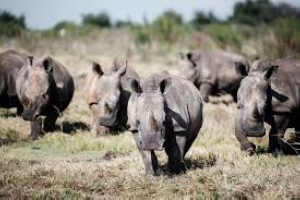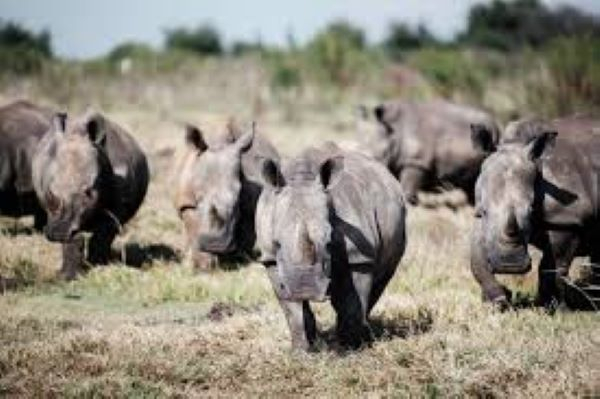 Wild white rhinos are seen at an undisclosed location in the North West Province of South Africa
Wild white rhinos are seen at an undisclosed location in the North West Province of South Africa
Seventy southern white rhinos have completed a journey of more than 3,400 kilometres (at least 2,112 miles) by truck and Boeing 747 from South Africa to Rwanda in what has been described as the largest translocation of its kind.
Part of a rewilding initiative, the rhinos were transported in two groups of 35 – first by airliner then by road – from South Africa’s Munywana Conservancy to the Akagera National Park in Rwanda, central Africa’s largest protected wetland, the Rwanda Development Board (RDB) said on Tuesday.
“The final phase of the 3,400km journey involved the rhino being transported by truck in individual steel crates from Munywana to King Shaka International Airport in Durban,” the RDB said.
“They were then carefully loaded by cranes into a Boeing 747, flown to Kigali International Airport, and finally transported to Akagera National Park by road,” it said.
The development board said the aim was to eventually rewild more than 2,000 rhinos “to safe, well-managed protected areas across the continent”.
The rhinos were released into the Rwandan park after their two-day journey and a veterinary team will monitor their progress in order to “manage any stress associated with the move and to ensure each rhino adapts well to its new environment”.
Described as “the first rhino move by air of this scale”, the rewilding initiative aims to support population growth for white rhinos and “secure a new breeding stronghold in Rwanda”.
White rhinos were once abundant across sub-Saharan Africa but their numbers have dramatically fallen due to large-scale poaching and hunting during colonial times.
According to the International Rhino Foundation (IRF), rhino poaching in Africa rose by 4 percent from 2022 to 2023, with at least 586 rhinos poached in 2023.
The southern white rhino, one of two subspecies, is now listed as “near threatened”, with roughly 17,000 individuals remaining, according to the International Union for Conservation of Nature (IUCN).
The northern white rhino is considered critically endangered, with the number of remaining mature adults listed by the IUCN as two at most.
